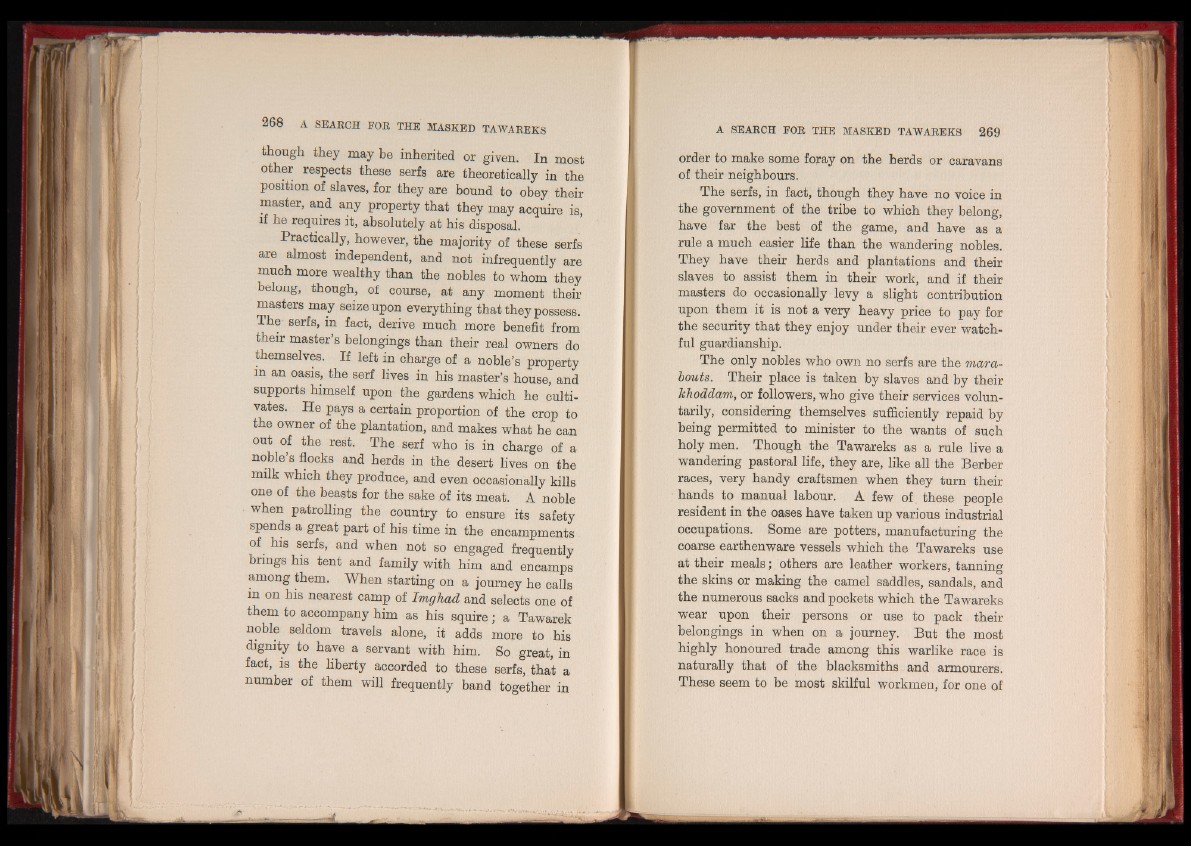
though they may be inherited or given. In most
other respects these serfs are theoretically in the
position of slaves, for they are bound to obey their
master, and any property that they may acquire is,
if he requires it, absolutely at his disposal.
Practically, however, the majority of these serfs
are almost independent, and not infrecraently are
much more wealthy than the nobles to whom they
belong, though, of course, at any moment their
masters may seize upon everything that they possess.
The serfs, in fact, derive much more benefit from
their master’s belongings than their real owners do
themselves. If left in charge of a noble’s property
in an oasis, the serf lives in his master’s house, and
supports himself upon the gardens which he cultivates.
He pays a certain proportion of the crop to
the owner of the plantation, and makes what he can
out of the rest. The serf who is in charge of a
noble’s flocks and herds in the desert lives on the
milk which they produce, and even occasionally kills
one of the beasts for the sake of its meat. A noble
when patrolling the country to ensure its safety
spends a great part of his time in the encampments
of his serfs, and when not so engaged frequently
brings his tent and family with him and encamps
among them. When starting on a journey he calls
in on his nearest camp of Imghad and selects one of
them to accompany him as his squire; a Tawarek
noble seldom travels alone, it adds more to his
dignity to have a servant with him. So great, in
fact, is the liberty accorded to these serfs, that a
number of them will frequently band together in
order to make some foray on the herds or caravans
of their neighbours.
The serfs, in fact, though they have no voice in
the government of the tribe to which they belong,
have far the best of the game, and have as a
rule a much easier life than the wandering nobles.
They have their herds and plantations and their
slaves to assist them in their work, and if their
masters do occasionally levy a slight contribution
upon them it is not a very heavy price to pay for
the security that they enjoy under their ever watchful
guardianship.
The only nobles who own no serfs are the marabouts.
Their place is taken by slaves and by their
khoddam, or followers, who give their services voluntarily,
considering themselves sufficiently repaid by
being permitted to minister to the wants of such
holy men. Though the Tawareks as a rule live a
wandering pastoral life, they are, like all the Berber
races, very handy craftsmen when they turn their
hands to manual labour. A few of these people
resident in the oases have taken up various industrial
occupations. Some are potters, manufacturing the
coarse earthenware vessels which the Tawareks use
at their meals; others are leather workers, tanning
the skins or making the camel saddles, sandals, and
the numerous sacks and pockets which the Tawareks
wear upon their persons or use to pack their
belongings in when on a journey. But the most
highly honoured trade among this warlike race is
naturally that of the blacksmiths and armourers.
These seem to be most skilful workmen, for one of